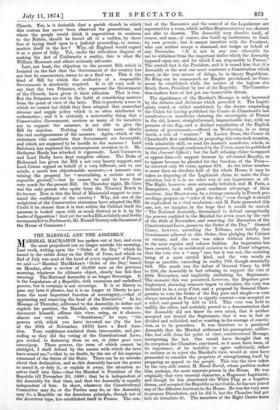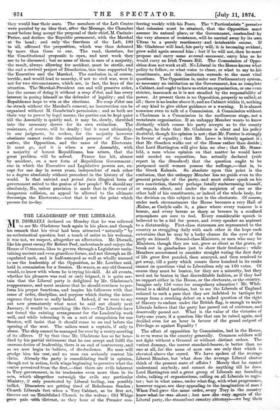THE MARSHAL AND THE ASSEMBLY.
MARSHAL MACMAHON has spoken out at last, and even the most prejudiced can no longer mistake his meaning. Last week, writing upon the " Order of the Day " which he issued to the entire Army on the 30th of June, and which on 2nd of July was read at the head of every regiment of France, we said :—" Marshal MacMahon's 4 Order of the Day,' issued on Monday, after a review of 50,000 men on the previous morning, whatever its ultimate object, clearly has this first meaning. The National Assembly is no longer Sovereign. It is the Legislature of a Republic, with enormous and undefined powers, but it certainly is not sovereign. It is at liberty to pass any laws it pleases, but it is no longer at liberty to per- form the most important function of sovereignty,—that of appointing and removing the head of the Executive." In his Message of Thursday, addressed to the Assembly, to define and explain his position, the Marshal, who evidently wrote the document himself, affirms this view, using, as it chances, almost our very words. " Gentlemen," he says, " the powers with which you have invested me (by the law of the 20th of November, 1873) have a fixed dura- tion. Your confidence rendered them irrevocable, and pre- ceding as they did the voting of the Constitutional Laws, you wished, in bestowing them on me, to fetter your own sovereignty. These powers, the term of which cannot be abridged, I shall defend by the means with which the laws have armed me,"—that is, no doubt, by the use of his supreme command of the forces of the State. There can be no mistake about that declaration, and as this Assembly has not the power to annul it, or defy it, or explain it away, the situation re- solves itself into this,—that the Marshal is President of the Republic till November 20, 1880 ; that he is independent of the Assembly for that time, and that the Assembly is equally independent of him. In short, whatever the Constitutional Committee may do, or the Parties may do, or the Assembly may do, a Republic on the American principle, though not of the American type, has established itself in France. The con- trol of the Executive and the control of the Legislature are separated for a term, which neither Representatives nor electors are able to shorten. The Assembly may dissolve itself, of course, and may, of course, also build up institutions to limit its own powers ; but it cannot interfere with the President, who can neither accept a dismissal, nor resign on behalf of any Pretender. " It is not in any case allowable for me to withdraw from the important duties which the Assembly imposed upon me, and for which I am responsible to France:' The central fact is the President, and it is round him that ths Assembly or the next one must construct a Constitution which must, in the very nature of things, be in theory Republican. No Bing can be summoned, no Empire proclaimed, no Com- mune be established, while the master of the legions sits firmly there, President by law of the Republic. The Constitu- tion-makers have at last got one immovable datum.
The significance of the Marshal's Message is only increased by the debates and divisions which preceded it. The Legiti- mists, vexed, or rather maddened, by the decree suspending the Union for having published the Comte de Chambord's last manifesto,—a _manifesto claiming the sovereignty of France in the old, honest, straightforward, impracticable way, with no promise of the flag, and a distinct repudiation of the English system of government,—offered on Wednesday, in so many words, a vote of " censure." M. Lucien Brun, the Comte de Chambord's first confidant, in proposing this vote took occasion, with admirable skill, to read his master's manifesto, which, in consequence, though condemned in the Union, must be published in the Journal Oficiel ; but the Left refusing either to support or oppose him—to support because he advocated Royalty, or to oppose because he pleaded for the freedom of the Press— he received only 80 votes, against 379. As the latter number is more than an absolute half of the whole House, it may be taken as disposing of the Legitimist claim to resist the Con- stitution, but it is in no other way of any importance at all. The Right, however, were extremely irritated, and M. Paris, a Bonapartist, took with great readiness advantage of their emotion. Any Member can, by a strange anomaly in French pro- ceedings, propose an " order of the day," even though it should be equivalent to a vital resolution ; and M. Paris presented this one, not, we imagine, in the hope that it would be carried. " The National Assembly, determined to defend energetically the powers confided to the Marshal for seven years by the vote of the 20th of November, and reserving the discussion of the Constitutional Laws, passes to the Order of the Day." General Cissey, however, ascending the Tribune, said briefly that Government adhered to this Order, thus pledging the Cabinet to victory, and the vote was taken without debate, but in the most regular and solemn fashion. An impression has been created, by an accidental omission in the Times' telegram, that the vote was a " snap " one, but it was not, the counting being of a most careful kind, and the vote nearly as large as possible, exceeding in reality 700, though nominally 698. The result was the defeat of General Cissey by 368 to 330, the Assembly in fact refusing to support the vote of 20th November, and implicitly abolishing the Septennate. The moment this was perceived, however, the Deputies grew frightened, alarming rumours began to circulate, the vote was declared to be a coup d'Itat, and a proposal by General Chan- gamier to vote the Order of the Day pure and simple—a vote
always intended in France to signify content—was accepted as a relief, and passed by 339 to 315. This vote was held to nullify the other, and certainly proved to a demonstration that the Assembly did not know its own mind, that it neither accepted nor denied the Septennate, that it was in fact so divided and redivided, and so wanting in the courage of convic- tion, as to be powerless. It was therefore to a paralysed Assembly that the Marshal addressed his peremptory, soldier- like, but still, from his point of view, constitutional Message, interpreting the law. One would have thought that on its reception the Chamber, convinced, as it must have been, of its impotence, of its inability to agree sufficiently either to endorse or to reject the Marshal's view, would at once have proceeded to consider the propriety of strengthening itself by preparing an appeal to the people. This was the view taken by the very able orator, M. Raoul Duval, whose position makes
him, perhaps, the most separate person in the House. He was originally that very unusual character a Huguenot Legitimist,
and though he has abandoned the Whita Flag as a hopeless dream, and accepted the Republic as inevitable, he has not joined any of the different fractions in the House. He was the very man
to propose Dissolution, and he did it, but the Chamber had got into an irresolute fit. The members of the Right Centre knew
they would lose their seats. The members of the Left Centre were-puzzled• by an idea-that, After thellessage, the Chamber must`before long accept- the• proposal of their 'chief, M. Casimir- Perier - and declare the Republic permanent, with the Marshal --at -it; -head ; and -only 'the 'fractions of the Left, 180 • in -all, affirmed the -proposition, which was thus defeated by more than three to one. The road, therefore, for the Constitutional -proposals.-is open, and next week they are to be 'discussed ; but as none -of' them is- sure of a majority, the result,slarays - allowing for accident, must be sterile, and the -end a•revived• projectrof Dissolution, this time supported by
• the Executive --and the Marshal. The confusion is, of course, -terrific, and-would lead to anarchy, if not to civil war, were it not 'for -two circumstances, which are, in fact, the keys of the -situation. Thelgarshal-President can and will preserve order, has the means of 'doing it without- a coup d'ertat, and has every interest in posing himself ais the defender of legality ; and the Republicans hope to win at the elections. No coup d'e'tat can be struck without the Marshal's consent, no insurrection can be organised without M.' Gambetta's permission ; and as both see their- way to power by legal means, the parties can be kept quiet till -the Assembly- is quietly and, it may be, slowly, throttled
into the necessary 'decree for its own extinction. The • resistance, of course, will be deadly ; but it must ultimately, in our judgment, be useless, for the majority however obstinate cannot resist the combined pressure of the Exe- cutive, the Opposition, and the - mass of the Electorate. It must go, and it is when a new Assembly, with a majority of honest 'Republicans has arisen, that the
-great problem will be - solved. France has hit, almost -by accident, on a -new form of 'Republican Government ; one in which the Executive and Legislative powers are, ex- cept for one clay• -seven years, independent of each other to a degree absolutely without precedent in the history of the world. Is that untried and prinici facie illogical form of government suited to the-genius of her- people? We should say absolutely,-No, unless provision is made that in the event of dangerous collision, an appeal be allowed to the ultimate Sovereign the Electorate,—but that is not the point which -presses for-to-day.



































 Previous page
Previous page